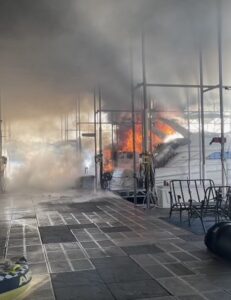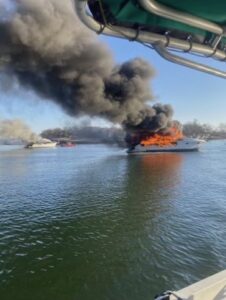At Erwin we care about our customers safety and boats. This is sadly what improperly heating your boat in the winter could cause.
Living in Tennessee, boaters never know what to expect when winter comes. Some years are extremely mild, and the risk of freeze damage is minimal. Then there are some years like this year and last year that the temperatures dropped into single digits and those who did not winterize pay a heavy price.
Do not get lazy with your prep work when the weather turns!
Those who do use a professional company to properly winterize can sit back on these cold days and be stress free knowing their boat is protected. However, those customers who choose to not winterize their boats must insure when these days come that they protect all the systems in the boat that can be damaged. This is usually accomplished by using heaters. Using heaters does work but there are some complications that can arise when using heaters. I will list a few of the dangers and some solutions so you can be aware and try to avoid some common mistakes.
- Do not use standard space heaters with open elements. (if you can see it glowing it’s not likely safe). Space heaters should be approved for the application. Boats are powered by combustible fuels and can emit vapors that can ignite with a heater. Make sure your heaters are rated properly. Usually, ceramic heaters are preferred in a cabin space. For bilge and engine areas it is recommended to purchase an actual bilge heater designed for this application.
- Make sure your heaters are manual controlled thermostats. In extreme weather conditioned it is common to have power outages. Many “automatic” heaters sold today will not reset themselves when the power comes back on. This would leave you with no heat and no real way to know it isn’t working without visiting the boat and checking it. To test this start your heater, then once it’s running unplug it and wait a minute or two and plug it back in. If the heater starts back up you may be okay. If it doesn’t and you have to power it back on manually it is not safe to use.
- Make sure your heaters are not near anything combustible like papers or blankets that could contact the heater and catch fire. Make sure it is on a stable surface like a counter our table top so it cannot fall over onto something combustible.
- Make sure your bilge heater is placed in a proper place in the bilge to get proper circulation throughout the whole bilge area. Test it at the beginning of each season to make sure it works. Most have either a test button to push or a thermostat hole you can spray freeze spray on to test it.
- Lastly, consider having a monitoring system installed professionally. We had two customers this week that we had installed monitoring systems on that were notified when their heaters were not heating the boat. We were able to get to the boats before the temperatures got cold enough to cause damage. These systems have endless options to monitor all systems. These systems will also notify you when shore power is lost, battery voltage is low, a bilge pump turns on, you can monitor multiple temperature sensors to see bilge temps, cabin temps, and cockpit temps. It also notifies you if your boat gets out of a predetermined GPS perimeter.


